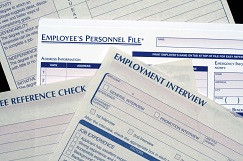Best Practices for Retaining Employee Records
By Olivia E. Gonzalez | Related Practices: Employment and Business
Download the Quick Guide to Employment Record Retention Laws
Employment record retention laws and statutes vary, making it costly and difficult to keep track of them. Here are a few tips and guidelines to help you stay compliant:
Retain Personnel Records for at Least Seven Years
- Many statutes specify the length of time certain records must be retained. The longest statute of limitations is six years on a contract claim. Therefore, employers should retain employee records for at least seven years from the date an employee leaves employment.
- Keep a separate file for medical records and medical information; this includes information and documents regarding Workers’ Compensation, Family and Medical Leave Act, and Americans with Disabilities Act.
- When an employee is accused of misconduct, documents related to employer’s investigation should be kept in a separate, confidential file. Disciplinary and investigatory records include warnings, suspensions, memos documenting warnings, and any written statements from the employee.
Permit Employees to Review Their Personnel Records at Least Annually
- Washington allows employees to review their personnel records at least annually.
- An employee may not require the employer to remove or alter any records, but has the right to supplement or rebut information in the personnel file while employed and for two years after the employee leaves employment.
- The review policy may extend to former employees. The Department of Labor & Industries provides that employees retain the right of inspection for two years after separation from employment. Washington Department of Labor & Industries Administrative Policy ES.C.7 (January 2, 2002).
- There is no right of access to records relating to a criminal investigation or to records compiled in preparation for an existing or threatened lawsuit that would not be accessible to another party (including the employee) under applicable discovery rules.
Immigration and Naturalization Service Form I-9
- Must be stored in a place and manner which enables the employer to produce them for inspection within three days of an inspection or audit request.
- The records may be stored electronically, but the U.S. Citizenship and Immigration Service (USCIS) has strict requirements for such storage to ensure confidentiality and security of the data contained within the records and to safeguard against and track any tampering.
- Consult with counsel if you want to electronically store I-9s and supporting documents in order to ensure compliance with USCIS standards.
- Additionally, keep in mind that government contractors have additional record-keeping requirements under the Rehabilitation Act and the Veterans’ Act.
Disposing of Personnel Records
When disposing of personnel records, do so while maintaining security and confidentiality of personal information, including financial and health information, social security numbers, account numbers and tax ID numbers.

